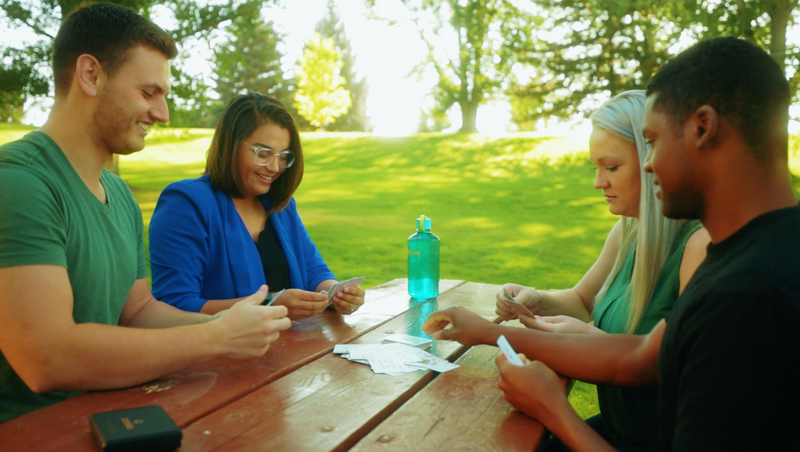
Many families in the US gather around for the holidays or get-togethers and play their favorite card games. Being in one of those families has many benefits, both as a family and personal.
As a family you can strengthen your bond together by working with one another to win a card game.
By playing card games, you can build many skills, to name a few; math, quick thinking, logical thinking, communication, and coping with losing. There’s no doubt we will all face a loss in our life, whether that be a person, or a job. Playing cards can help you get past a loss, and continue to work hard and move forward.
Increasing Popularity
We may think that with the rise of video games and online stimulation, card games are falling out. Frankly, that’s not the case. In fact, card games are increasing in popularity. See this graph posted by grandviewresearch.com.

Looking at the graph, we can see that card games will continue to increase in popularity until at least 2025. So, we know that more and more families and people will be playing card games for the very first time. Here are some tips and tricks that will give you a good start to playing cards with your family.
The Classic Deck of Playing Cards
In a classic deck of cards, there will be 52 cards and 2 jokers. We count the jokers differently because they are not used in all card games. In the games that use the jokers, they can have many uses; a wildcard, a substitute card, or the highest card in the deck, it will depend on the game.
As for the 52 cards, there are 4 suites; clubs, diamonds, hearts, and spades. There are 13 cards for each suit.
Each suite will have an Ace, King, Queen, Jack, 10, 9, 8, 7, 6, 5, 4, 3, and 2 (1 of each). These are the 13 cards for each suit.
In many games, cards will use a ranking system to determine who wins that trick (a term we will learn later on). They rank as follows.
- Ace (highest)
- King
- Queen
- Jack
- 10
- 9
- 8
- 7
- 6
- 5
- 4
- 3
- 2 (lowest)
Best Practices With A New Deck Of Cards
There are 2 main materials that a deck of cards is made out of. Paper (cardstock) and Plastic. Paper cards are generally more popular, as they are much cheaper. Although cheaper does not mean better.
For traditional play, it’s best to use plastic cards. They are a bit easier to shuffle, and will last for much much longer. Some people say that a deck of 100% plastic cards will last them up to a year. Whereas paper will start to see wear and tear after the first week of play, and may be unusable after 6 weeks. Over time, you will actually save money by choosing a plastic deck.
The reason a paper deck may be unusable is because in most games you want to keep your cards hidden from other players, if the ace of spades has a definite crease or tear, you could give away your card to other players and create an unfair game.
Plastic cards are almost fully resistant to creasing and tearing.
The best thing to do with a deck of cards is aways store them in the box, or in the tuck (another term we will learn). And be careful not to shuffle them too hard, shuffling will come easier the longer you do it.
Learning To Shuffle, Bridge, and Deal
Speaking of shuffling, this is something all card players should know how to do. There are many videos on youtube explaining how to do it, but why do we do it?
Shuffling is a technique that essentially “shuffles” the cards so they are in a random order. If we never shuffled, games would start getting predictable.
Bridging may be a new term to you, but this is the act of bending the cards back to their original shape. (not much of a problem with plastic cards). When you shuffle, you bend all of the cards one way, when you bridge, you bend them back. Again, you can probably find a great youtube video on how to bridge.
Dealing is where you hand out cards to each player. This always happens after 2-3 shuffles to make sure the cards are mixed up.
What To Avoid & Etiquette You Should Follow
When playing card games, there is etiquette involved, and also some things to avoid. We all make mistakes, but avoiding these things will create a better experience overall.
- Avoid eating food and playing cards at the same time
- Make sure to count when dealing. This will be helpful right when you start dealing and shuffling, dealing incorrectly can screw a whole game up. If there are 4 players, count 1,2,3,4, 1,2,3,4 and so on until all of the cards are gone, or until each player has a set amount of cards.
- Avoid grabbing your cards until all of the cards are dealt, or you have the set amount of cards you need.
- Don’t look at the cards until you have your hand. Don’t cheat and try to get an advantage.
- Avoid dropping your cards, this will reveal your cards to other players and you will most likely lose.
- Don’t markup cards to cheat. Don’t cheat in general, then no one will want to play with you.
A Few Terms To Know
As with all new hobbies, there is jargon that you will have to learn, here are some common words that will be said at the card table.
- Bridge-size Deck - A narrower deck of cards with a width of 2.25 inches.
- Poker-size Deck - A deck that is 2.5 inches wide (more common).
- Face-down - A card placed on a table where the back is showing.
- Face-up - A card placed on the table where the number or picture is showing.
- Index - The number or letter indicating the card’s value.
- Rank - The order in which a card ranks in comparison to other cards played or shown.
- Trick - A specific round in a game where the winner takes the cards to indicate a “win.”
- Tuck - The box or cardstock pack the deck is contained in.
- Hand - The set of cards you have.
- Trump - The suit that outranks the other cards. Ex. In the game “Spades” the suit spades outranks all other cards. (2 of Spades outranks an Ace of Hearts).
Now That You Are Ready To Play
If you have read everything and are ready to start shuffling and playing, take a look at the cards we have to offer below. As mentioned previously, most are 100% plastic cards that will last you much longer.
Have fun!
